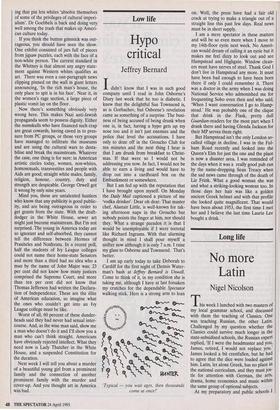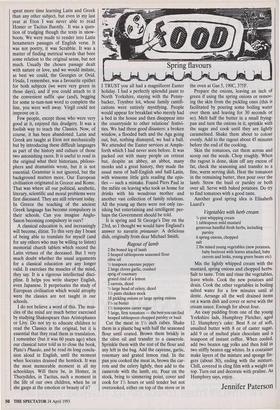Long life
No more Latin
Nigel Nicolson
At my preparatory and public schools I spent more time learning Latin and Greek than any other subject, but even in my last year at Eton I was never able to read Homer or Tacitus fluently. It was a ques- tion of trudging though the texts in snow- boots. We were made to render into Latin hexameters passages of English verse. It was not poetry, it was Scrabble. It was a matter of finding metrical words that bore some relation to the original sense, but not much. Usually the chosen passage dealt with nature or love, and we would imitate, as best we could, the Georgics or Ovid. Viridis, I remember, was a favourite epithet for both subjects (we were very green in those days), and if you could attach to it the convenient suffix -que (and), begging for some te-tum-tum word to complete the line, you were well away. Virgil could not improve on it.
Few people, except those who were very good at it, enjoyed this drudgery. It was a foolish way to teach the Classics. Now, of course, it has been abandoned. Latin and Greek are taught at Eton not mechanically but by introducing these difficult languages as part of the history and culture of those two astonishing races. It is useful to read in the original what their historians, philoso- phers and dramatists wrote, but it is not essential. Grammar is not ignored, but the background matters more. Our European civilisation originated in Greece and Rome. That was where all our political, aesthetic, literary, scientific and moral problems were first discussed. They are still relevant today. In Greece the teaching of the ancient Greek language has become compulsory in their schools. Can you imagine Anglo- Saxon becoming compulsory in ours?
A classical education is, and increasingly will become, elitist. To this very day I boast of being able to translate for myself (and for any others who may be willing to listen) memorial church tablets which record the Latin virtues of the deceased. But I very much doubt whether the usual arguments for a classical education are any longer valid. It exercises the muscles of the mind, they say. It is a rigorous intellectual disci- pline. It helps you write sharper English, even Japanese. It perpetuates the study of European civilisation which would atrophy were the classics are not taught in our schools.
I do not believe a word of this. The mus- cles of the mind are much better exercised by studying Shakespeare than Aristophanes or Livy. Do not try to educate children to read the Classics in the original, but it is essential that they read them in translation. I remember (but it was 60 years ago) when our classical tutor told us to close the book, Plato's Phaedo, and he read its long conclu- sion aloud in English, until the moment when Socrates drained the hemlock. It was the most memorable moment in all my schooldays. Will there be, in Homer, in Thucydides, in Tacitus, such a moment in the life of our own children, when he or she gasps at the emotion or beauty of it?



























































 Previous page
Previous page